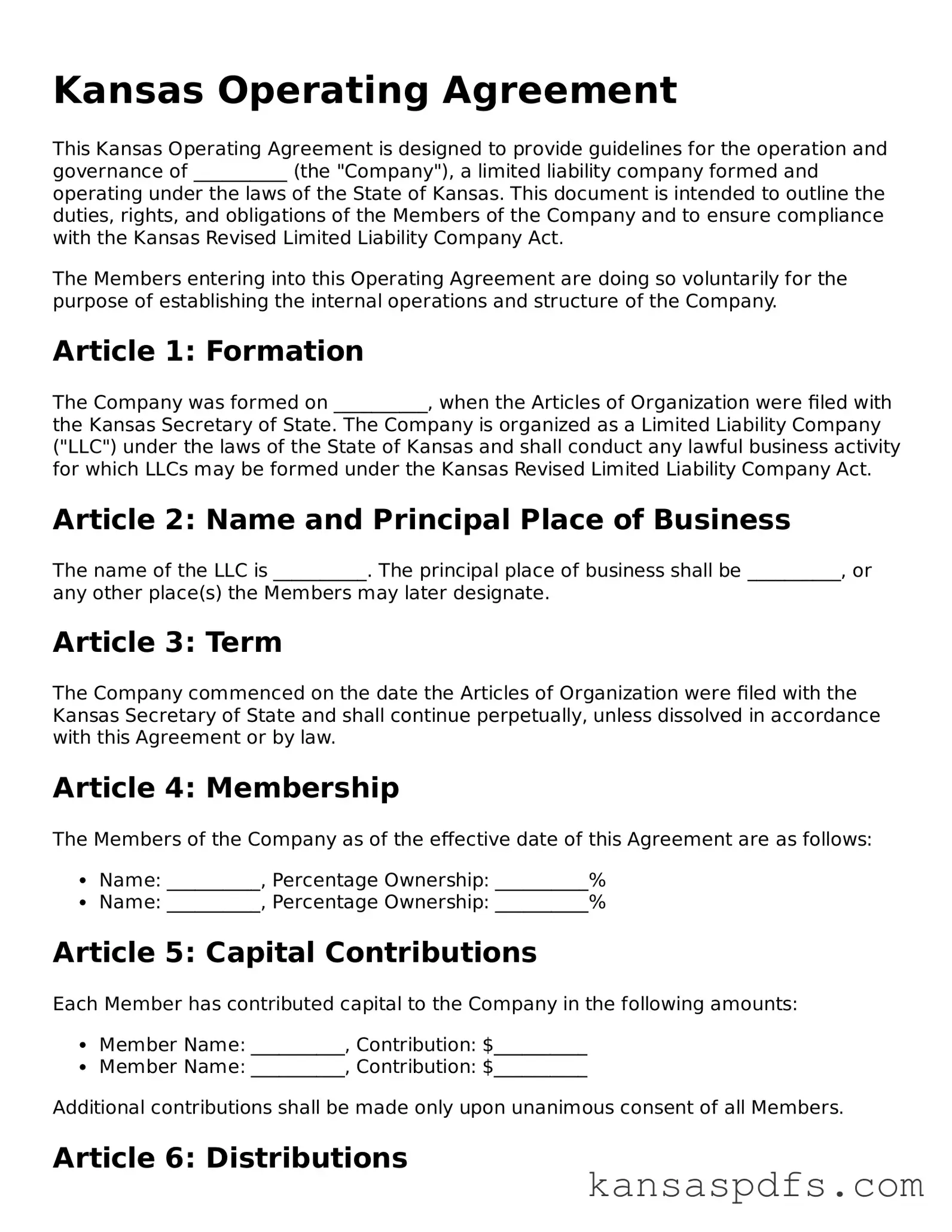Kansas Operating Agreement
This Kansas Operating Agreement is designed to provide guidelines for the operation and governance of __________ (the "Company"), a limited liability company formed and operating under the laws of the State of Kansas. This document is intended to outline the duties, rights, and obligations of the Members of the Company and to ensure compliance with the Kansas Revised Limited Liability Company Act.
The Members entering into this Operating Agreement are doing so voluntarily for the purpose of establishing the internal operations and structure of the Company.
Article 1: Formation
The Company was formed on __________, when the Articles of Organization were filed with the Kansas Secretary of State. The Company is organized as a Limited Liability Company ("LLC") under the laws of the State of Kansas and shall conduct any lawful business activity for which LLCs may be formed under the Kansas Revised Limited Liability Company Act.
Article 2: Name and Principal Place of Business
The name of the LLC is __________. The principal place of business shall be __________, or any other place(s) the Members may later designate.
Article 3: Term
The Company commenced on the date the Articles of Organization were filed with the Kansas Secretary of State and shall continue perpetually, unless dissolved in accordance with this Agreement or by law.
Article 4: Membership
The Members of the Company as of the effective date of this Agreement are as follows:
- Name: __________, Percentage Ownership: __________%
- Name: __________, Percentage Ownership: __________%
Article 5: Capital Contributions
Each Member has contributed capital to the Company in the following amounts:
- Member Name: __________, Contribution: $__________
- Member Name: __________, Contribution: $__________
Additional contributions shall be made only upon unanimous consent of all Members.
Article 6: Distributions
Profits and losses shall be allocated, and distributions made to the Members, in proportion to their respective percentage of ownership in the Company, subject to the provisions of this Agreement and applicable law.
Article 7: Management
The Company shall be managed by its Members. Decisions regarding the operation of the Company shall be made by a majority vote of the Members, except where unanimity is required by this Agreement or by law.
Article 8: Powers and Duties of Members
Members are authorized to perform any and all actions necessary or appropriate to manage and operate the Company, consistent with the Company’s purpose and this Agreement, including but not limited to: entering into contracts, borrowing money, and acquiring, managing or disposing of property.
Article 9: Transfers of Membership Interest
Except as provided in this Agreement, no Member may transfer, sell, assign, or otherwise dispose of their interest in the Company without the written consent of all other Members.
Article 10: Dissolution
The Company may be dissolved upon a unanimous vote of all Members or as otherwise provided by the Kansas Revised Limited Liability Company Act. Upon dissolution, the Company’s affairs shall be wound up and its assets distributed as required by law and this Agreement.
In witness whereof, the undersigned have executed this Operating Agreement as of the last date written below:
Member Signature: __________ Date: __________
Member Signature: __________ Date: __________
This Kansas Operating Agreement is a template designed to provide a basic framework for the operation of a limited liability company in Kansas. It is essential for the Members to review and adapt this document as necessary to reflect their specific arrangement and to ensure compliance with current laws and regulations.

